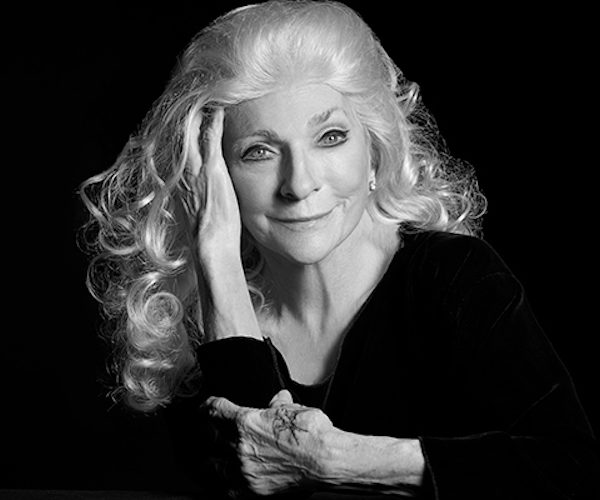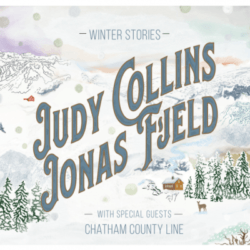Concert Preview: Judy Collins Heats Up Some “Winter Stories”
By Noah Schaffer
“People love a story, they always have, and always will, and stories are an essential ingredient in this folk music revival, which started sometime in the early ’50s.”

Singer Judy Collins. Photo: courtesy of the artist.
Joan Baez and Joni Mitchell have retired and Leonard Cohen has passed away, but recent years have seen a burst of activity from their friend and peer Judy Collins. During her 70s, the folk icon released her memoirs and six albums, including a Grammy-nominated collaboration with songwriter Ari Hest, as well as being part of a tour (Arts Fuse review) and recording with former lover Stephen Stills. At the age of 80, she’s releasing Winter Stories this week. The LP was made with Norwegian songwriter Jonas Fjeld, who once was a member of an acclaimed trio with Eric Andersen and Rick Danko. He has also worked with the North Carolina bluegrass band Chatham County Line. Collins, along with Fjeld and Chatham County Line, will perform at The Wilbur in Boston on Sunday night. She recently spoke to the Arts Fuse from her New York home.
Arts Fuse: Your new album features Chatham County Line, the kind of bluegrass band that you might have shared the stage with in Greenwich Village in the early ’60s. What was it like collaborating with a string band?
Judy Collins: It was wonderful and I’ve never moved away from guitars as you know (laughs) — both my own and others — but it was exciting because they are so talented and so much fun to perform with. We actually hadn’t met before, so our first get together was when we went to record. We had a meeting about a year ago to look at each other and make sure we wouldn’t run away screaming, and it worked out really well, so we got together in February to record in Ashville…. We chose the songs to go around the theme of winter, and I think it worked out pretty well. One of the songs is Joni’s “River,” which I’ve never done before, and now I’m glad I never did it because it’s perfect for this.
AF: It’s pretty clear how many of these songs fit into the “winter” theme, but there are some less obvious choices, such as Jimmy Webb’s “Highwayman.”
Collins: Well it is very much of the winter season in the sense that it is really about rebirth, so that sort of shoved it into the category.
AF: You also revisited your composition “The Blizzard,” which has become a signature piece during your concerts. Why do you think the song has resonated so much with your audiences, and why did you want to revisit it?
Collins: Well I recorded that for a Sony album in 1989. It was an album called Fires of Eden. Sony really dumped me and treated me very badly, so the song didn’t get anywhere because they canceled the album. Although people don’t know it, in concert I start it and when I finish the song people go crazy. They say to me, “Why haven’t we got a proper recording of it?” So this was the opportunity. It’s a romance in the snow, isn’t it? People love romances in the snow, they love them anywhere. And it has a mystery about it which is always intriguing, and I think the mystery is what carries it. People love a story, they always have, and always will, and stories are an essential ingredient in this folk music revival, which started sometime in the early ’50s. Stories are what get people through life, and this is a big, bountiful story song. It’s a good story with a good ending.
AF: Speaking of story songs, the album includes “Northwest Passage” by Stan Rogers, the late maritime Canadian songwriter. I understand he’s someone whose songs are relatively new to you.
Collins: It’s incredible, I missed him. I’ve certainly recorded many Canadian writers starting with Ed McCurdy. It’s very strange that I missed Stan Rogers. A few years ago I went to the Stan Rogers Festival in Nova Scotia. My dressing room was a trailer at the top of the hill, and down at the performance center in the misty rain I heard this song coming up the hill, and thought “My God, what is that song?” and it was “Northwest Passage.” So I’ve been waiting a number of years to get this into the right situation and, boy, is it the right one.
 AF: That’s one of the tracks which is really a duet with Jonas Fjeld. Can you talk about him?
AF: That’s one of the tracks which is really a duet with Jonas Fjeld. Can you talk about him?
Collins: He is a wonderful melodist and a singer and I’ve known him for a while. We recorded years ago “Angels in the Snow” together. I know him because my manager is married to a Norwegian … so ever since I’ve known him I’ve followed his music. And he had worked with Chatham County Line, so we just had a good time together.
AF: Cambridge’s Passim just celebrated its 60th anniversary this month. Those decades include its original incarnation as Club 47, so I was wondering if any Club 47 memories come to mind.
Collins: The first time I was in Boston I was working in a club called the Golden Vanity. Do you know about it?
AF: No, I’ll have to research it…
Collins: I met Bob Jones, a lot of singers there, I worked there for two weeks in the winter of 1962 commuting from [my home in] Storrs, CT, until I hit a storm and couldn’t get in on the last night. It was across from BU by the railroad tracks and then the Unicorn opened and then Club 47, and I had a wonderful time there. I was looking at a picture someone sent me recently that has Mimi [Fariña], Debbie Green, and Maria Muldaur, they’re all in this picture. I remember [the early ’60s Boston folk scene] fondly, I think that’s where my audience really started to grow. And I met my wonderful friend John Cooke, who played with the Charles River Valley Boys. I adored him, such a wonderful friend. I used to go up and work the Unicorn and stay with Dick and Mimi Fariña.
AF: A lot of your music isn’t overly political, but you’ve certainly never shied away from making your social concerns clear. Your career started in an era of great political turmoil, and here we are…
Collins: [Laughs] They say that history doesn’t repeat itself, but it rhymes. My most recent political song is called Dreamers – it’s about immigration. There’s a video and a song on iTunes…. I feel very strongly about our commitment to immigration, the fact that we are all immigrants. Even the Indians came over from the Bering Straits.
Over the past 15 years Noah Schaffer has written about otherwise unheralded musicians from the worlds of gospel, jazz, blues, Latin, African, reggae, Middle Eastern music, klezmer, polka and far beyond. He has won over ten awards from the New England Newspaper and Press Association.

